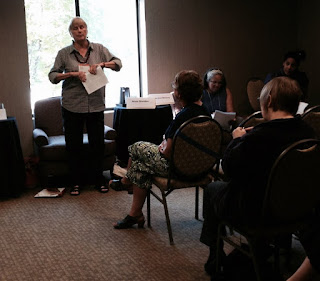The Power of Reading,
Viewing and Listening
by Jackie Hatton
2017 was a sad year for me. I lost three very good men who
were central to my life, my family, my history. It made no sense. It made me
angry. It made me numb. Every book I read tasted like cardboard. Every song
reeked of cheap sentiment. Television series and movies all felt too glossy,
contrived. I was bereft of my usual comforts and pleasures.
Then along came The
Stars are Legion. I don’t think I
need to describe this book — Kameron Hurley has rightly won prizes and plaudits
and widespread recognition for her all-female space opera. I don’t want to talk
too much about the politics of the work either — Hurley’s exploration of the
relationship between power, sex and violence was interesting but not entirely
unexpected. Her philosophical contemplations ran deeper — the concept of total
recycling and women giving birth to parts of a world was perfect fictional
musing for the existentialist in all of us — but that was still not what hooked
me on this work. What I really loved was the way that Hurley’s powerful
evocation of emotion under pressure — anger, despair, passion, compassion —
managed to budge my frozen heart and blow out the cobwebs settling into my
mind.
Suddenly I could feel and think again. Women fighting futile and inexplicable
battles against enemies they don’t fully understand, in the name of misguided
ideologies and loyalties, for the sake of saving a world that is randomly cruel
and falling apart anyway. Death on every page, death of the body, death of the
planet, death of dreams, death of relationships. Talk about parallels with
absolutely everything. I stayed awake at nights for a week completing this
book. I was of course awaiting some kind of pay off — rebirth, realization,
hope — and luckily I got it. This is a book that has strangely helped me to
accept and process the inevitable cycle of life.
At around the same time that I completed The Stars are Legion I finally found
something that was emotionally, politically, and philosophically compelling to
view as well. After spending too much time bingeing on Netflix series that feel
generic to me — too slick, too many hooks, no true end in sight, just a
never-ending bag of glossy tricks that didn’t satisfy — I discovered a BBC1
(UK) box-set of a six-part drama series called Broken. This is the story of
a flawed (but decent) Catholic priest who is struggling with his faith as he
attempts to help parishioners in one of the poorest of northern neighborhoods.
There is a single mother struggling both to make ends and to curb her temper,
there is a woman with a humiliating secret planning suicide, there is a mother
seeking justice for her mentally ill son, shot dead by the police, and there is
the policeman struggling with his conscience. Those are just the main
characters. Every single person on screen matters in this drama — every single
human interaction reveals a little something about the nature of our endless
human struggle with forces both without and within. Television drama used to be
like this — writ on a smaller scale, digging deeper, speaking to things we know
or want to know, giving us pause rather than cheap distraction. Written by one
of the keenest observers of the English class system — Jimmy McGovern — and
with a cast led by Sean Bean and Anna Friel I cannot recommend Broken highly enough. It is not a
Netflix series. You will have to work a little harder to get it, same as you
will have to work a little harder to watch it, but I like to think that you
will feel better for it. I did. I felt genuinely uplifted by it.
In a year filled with bitter-sweet memories I sought out
new, not old music. No endless replays of David Bowie and Tom Petty for
me. Instead I looked for music that
would not remind me of anything, music that would take me elsewhere. Shazam
helped. I would sit in bars and cafes, point my phone at the speaker and
discover new tracks. This is how I found Alice Merton, a German-Irish
singer-song writer, who sounds more like Sia than Sinead. Her debut single, No Roots, is a brightly soulful number that will have your
shoulders dancing in spite of yourself. In a year when I had no choice but to
confront the practical and emotional consequences of a nomadic life this song
spoke to my soul. Rather than choose to
be sad about her own lack of deep geographic roots, Merton embraces a life in
motion. No Roots is a song of
honesty, reflection and acceptance. It is my song of 2017.
Happy New Year, Fellow Aqueductistas.
Jackie Hatton was born in Australia and lives in Amsterdam. She spent a glorious girlhood in
Tasmania, came of age in the suburbs of Melbourne, became her own person at
Melbourne University, then jumped at the opportunity to move to the US for
graduate school. She was taught by a long series of strong-minded women who
encouraged her in many different ways and to whom she is permanently
indebted. After completing her Ph.D. in American Women's History at Cornell
University she has done many different things, most of which fall under the
rubric of "pen-for-hire." Aqueduct Press published her novel Flesh & Wires. You can find her at
www.jackiehatton.net.















